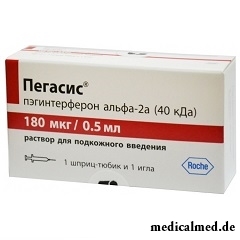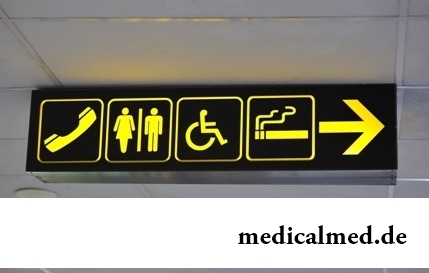





Pegasis
Application instruction:
 Pegasis – the immunomodulatory medicine with antiviral action applied at treatment of chronic hepatitis.
Pegasis – the immunomodulatory medicine with antiviral action applied at treatment of chronic hepatitis.
Form of release and structure
Pegasis release in the form of solution for hypodermic introduction: transparent liquid, from light yellow color to colourless (on 0,5 or 0,6 ml in the syringe tubes with a needle (needles), 1 unit-dose syringe in a cardboard pack; on 0,5 ml in the syringe tubes with the built-in protected needle in an autoinjector Proklik, 1 autoinjector in a cardboard pack; on 1 ml in bottles (bottles), 1 or 4 bottles in a cardboard pack).
Is a part of 0,5 ml of solution:
- Active ingredient: peginterferon alpha 2а (40 kd) – 0,135 or 0,18 mg;
- Additional components: benzyl alcohol – 5 mg; sodium chloride – 4 mg; sodium acetate trihydrate – 1,3085 mg; glacial acetic acid – 0,0231 mg; polysorbate of 80 - 0,025 mg; 10% acetic acid – to pH 6,0; 10% sodium acetate solution – to pH 6,0; water for injections – to 0,5 ml.
Indications to use
- Chronic Hepatitis C (CHC): at adults from positive VGS RNA, with the compensated cirrhosis or without cirrhosis, including and with clinically stable coinfection of HIV. In combination with ribaviriny Pegasis appoint the patient with HGS which did not receive therapy earlier, or to patients who have a previous monotherapy by interferon an alpha (not pegylated or pegylated) or the therapy combined with ribaviriny was inefficient. As monotherapy drug is appointed at intolerance or existence of contraindications to a ribavirin;
- Chronic hepatitis B (HGV): HBeAg-positive and HBeAg-negative at adults with the compensated damage of a liver and symptoms of virus replication, a superactivity of alaninaminotranspherase and histologically the confirmed fibrosis and/or an inflammation of a liver.
Contraindications
- Autoimmune hepatitis;
- Liver failure in a heavy current;
- Dekompensirovanny cirrhosis;
- Cirrhosis on a scale of Chayld-Pyyu – with score ≥6 at patients with VICh-HGS coinfection under a condition if increase in this indicator is not connected with an indirect hyperbilirubinemia because of administration of drugs, such as индинавир and атазанавир;
- Serious cardiovascular illnesses in a decompensation stage, including with badly controlled unstable current for the previous 6 months;
- Age up to 3 years (because of Pegasis who is a part of benzyl alcohol);
- Pregnancy and period of breastfeeding;
- Hypersensitivity to the genetically engineered drugs received by means of E.coli, interferon an alpha to polyethyleneglycol or other components of Pegasis.
At purpose of the combined treatment with ribaviriny it is necessary to consider contraindications for two drugs.
Route of administration and dosage
Pegasis's solution should be entered into the area of a hip or a front abdominal wall subcutaneously.
Therapy needs to be carried out under observation of the experienced doctor.
At purpose of the combined treatment with ribaviriny it is also necessary to consider instructions on its use.
At the standard mode of dosing Pegasis appoint in a dose 0,18 mg once a week. Before introduction solution needs to be examined regarding discoloration and lack of foreign impurity.
At treatment of HBeAg-positive and HBeAg-negative HGV duration of a course of monotherapy makes 48 weeks.
At HGS at the patients who were not receiving earlier therapy Pegasis appoint independently or in combination with oral administration of a ribavirin (during food).
The recommended dosing mode at the prompt virologic reply (a dose of a ribavirin (at body weight) / course duration; the low virus loading (LVL) – ≤ 800 000 ME/ml, the high virus loading (HVL) –> 800 000 ME/ml):
- Genotype 1: NVN – 1000 mg (<75 kg) or 1200 mg (≥75 kg) of/24 or 48 weeks; VVN – 1000 mg (<75 kg) or 1200 mg (≥75 kg) of/48 weeks;
- Genotype 2 or 3: NVN – 800 mg / 16 or 24 weeks; VVN – 800 mg / 24 weeks;
- Genotype 4: 1000 mg (<75 kg) or 1200 mg (≥75 kg) of/24 or 48 weeks.
The recommended dosing mode without prompt virologic reply (a dose of a ribavirin (at body weight) / course duration):
- Genotype 1 or 4: 1000 mg (<75 kg) or 1200 mg (≥75 kg) of/48 weeks;
- Genotype 2 or 3: 800 mg / 24 weeks.
Irrespective of initial virus loading, course duration at patients with a genotype 1 at whom on the 4th week of use of drug VGS RNA is defined, has to make 48 weeks.
Therapy lasting 24 weeks can be associated more likely a recurrence, than lasting 48 weeks.
Clinical data at patients with a genotype 5 and 6 are limited therefore in this case carrying out a combination therapy with ribaviriny (1000/1200 mg) for 48 weeks is recommended.
The recommended monotherapy duration – 48 weeks.
For the patients who were earlier receiving treatment usually appoint: Pegasis – once a week on 0,18 mg, рибавирин – 1000/1200 mg a day (body weight <75 / ≥ 75 kg).
If the virus is found on the 12th week of treatment, drug is cancelled.
The recommended general duration of a course – 48 weeks. At the solution of a question of purpose of therapy to patients with the genotype 1 which did not answer the previous treatment with pegylated interferon with ribaviriny duration of a course is increased up to 72 weeks.
At VICh-HGS coinfection Pegasis in a standard dose apply separately or along with ribaviriny (800 mg). Course duration irrespective of a genotype makes 48 weeks.
In case of need dose adjustment because of laboratory or clinical reactions of average and heavy severity, as a rule, has enough to reduce dose to 0,135 mg. However the dose decline to 0,09 or 0,045 mg in some cases is required. After improvement of a state increase in a dose is possible up to standard.
At reduction of number of neutrophils it is less than 750 cells / мкл the dose decline is recommended. At the absolute number of neutrophils (ANN) it is less than 500 cells / мкл therapy it is necessary to interrupt until this indicator does not exceed 1000 cells / мкл. Pegasis's use in a dose of 0,09 mg can be resumed under periodic control of number of neutrophils.
The dose decline to 0,09 mg is shown at reduction of quantity of thrombocytes less than 50 000 cells / мкл. If the number of thrombocytes is less than 25 000 cells / мкл, cancel drug. At the anemia which arose during therapy it is recommended:
- Reduction of a daily dose of a ribavirin to 600 mg (200/400 mg in the morning and in the evening) is recommended in one of the following situations: decrease in hemoglobin is less than 10 g/dl, but patients have more than 8,5 g/dl without the accompanying cardiovascular pathologies; decrease in hemoglobin by 2 g/dl or more within any 4 weeks of treatment in the presence of stable cardiovascular diseases. Increase in a dose of a ribavirin to initial is not recommended;
- The termination of reception of a ribavirin is shown in one of the following situations: decrease in hemoglobin is less than 8,5 g/dl at patients without the accompanying cardiovascular pathologies; preservation of hemoglobin at the level of less than 12 g/dl in 4 weeks, despite reduction of a dose in the presence of stable cardiovascular diseases. At the discretion of the doctor after improvement of indicators resuming of reception of a ribavirin in a daily dose of 600 mg with the subsequent increase up to 800 mg is possible. Increase in a dose to standard (1000/1200 mg) is not recommended. In case of intolerance of a ribavirin further carry out monotherapy by Pegasis.
During therapy increase in activity of alaninaminotranspherase (ALT) above an indicator before treatment, including patients with the virologic answer is observed. At the progressing increase in activity of ALT in comparison with indicators before treatment, the dose is reduced to 0,135 mg in the beginning. If, despite it, the indicator of ALT continues to increase or treatment proceeds with increase in concentration of bilirubin or symptoms of a decompensation of hepatic process, therapy is cancelled.
At patients with HGV perhaps passing increase in activity of ALT in certain cases exceeding the upper bound of norm by 10 times that can testify to an immune clearance (therapy is not appointed). After normalization of activity of ALT resuming of a medical course is possible.
At the compensated cirrhosis (on a scale of Chayld-Pyyu – a class A) use of drug is considered safe and effective. At dekompensirovanny cirrhosis (on a scale of Chayld-Pyyu – the class B/C or bleeding from varicose veins of a gullet) the profile of safety of Pegasis is not studied.
To patients with an end-stage of a renal failure Pegasis appoint 0,135 mg in a dose. Such patients need careful monitoring of a state and, cases of development of side effects, further dose adjustment.
Correction of the mode of dosing is not required to patients of advanced age.
For children of 3-18 years the profile of safety of drug was not studied.
When performing therapy by Pegasis (monotherapy or the combined use with ribaviriny) cases of rejection of renal and hepatic transplants are recorded.
Side effects
At treatment of HGS the most widespread disturbances are expressed, as a rule, in easy or moderate degree, and dose adjustments or cancellations of therapy do not demand. The profile of safety of Pegasis at treatment of HGV is similar to that at HGS, however at HGV side effects develop with considerably smaller frequency, except the frequency of developing of fever.
Possible disturbances during Pegasis's use (it is very frequent (≥1/10), it is frequent (≥1/100 and <1/10), infrequently (≥1/1000 and <1/100), it is rare (≥1/10 000 and <1/1000), it is very rare (<1/10 000)):
- Cardiovascular system: often – heartbeat, tachycardia, peripheral hypostases; infrequently – arterial hypertension; seldom – a cardiomyopathy, congestive heart failure, stenocardia, a myocardial infarction, arrhythmia, hemorrhage in a brain, supraventricular tachycardia, fibrillation of auricles, a pericardis, a vasculitis;
- Skeletal and muscular system: very often – arthralgias, mialgiya; often – pains (in bones, a back, a neck), muscular weakness, arthritis, muscular spasms, musculoskeletal pain; seldom – a miositis;
- Respiratory system: very often – диспноэ, cough; often – nasal bleeding, диспноэ at an exercise stress, a nasopharyngitis, pharyngalgias, a nose congestion, hypostasis of bosoms, an inflammation of a mucous membrane of a nasal cavity; infrequently – goose breathing; seldom – an embolism of a pulmonary artery, an intersticial pneumonitis;
- Gepatobiliarny system: infrequently – functional disturbances of a liver; seldom – a cholangitis, a liver failure, fatty dystrophy of a liver;
- Alimentary system: very often – nausea, diarrhea, an abdominal pain; often – bleeding of gums, vomiting, a dysphagy, dyspepsia, an ulceration of a mucous oral cavity, a glossitis, a meteorism, stomatitis, dryness of a mucous oral cavity; infrequently – gastrointestinal bleeding; seldom – pancreatitis, a round ulcer;
- Immune system: infrequently – a disease of Benye-Beka-Shaumana, a thyroiditis; seldom – a system lupus erythematosus, an anaphylaxis, a pseudorheumatism; very seldom – a trombotichesky or idiopathic Werlhof's disease, a Quincke's disease;
- Urinary system: seldom – a renal failure;
- Lymphatic system and blood: often – anemia, thrombocytopenia, a limfoadenopatiya; seldom – a panhemocytopenia; very seldom – aplastic anemia;
- Reproductive system: often – impotence;
- Endocrine system: often – a hyperthyroidism, a hypothyroidism; infrequently – a diabetes mellitus; seldom – diabetic ketoacidosis;
- Nervous system: very often – dizziness, a headache, disturbance of concentration of attention; often – syncopal states, memory disturbances, weakness, nightmares, migraine, a hyperesthesia, a hypesthesia, paresthesia, disturbance of flavoring feelings, a tremor, drowsiness; infrequently – a peripheral neuropathy; seldom – spasms, a coma, neuritis of a facial nerve;
- Infections: often – a herpes simplex, bronchitis, upper respiratory tract infections, candidiasis of a mucous membrane of an oral cavity, an infection of a fungal and bacterial etiology; infrequently – skin infections, pneumonia; seldom – outside otitis, an endocarditis;
- New growths (high-quality and malignant): infrequently – a liver new growth;
- Metabolism: very often – anorexia; infrequently – dehydration;
- Mentality: very often – concern, a depression, sleeplessness; often – changes of mood, decrease in a libido, emotional frustration, nervousness, aggression; infrequently – suicide thoughts, hallucinations; seldom – mental disorders, a suicide;
- Sight: often – a xerophthalmia, pain in an eyeglobe, a vision disorder, diseases of eyes of an inflammatory etiology; infrequently – a retinal apoplexy; seldom – defeats of vessels of a retina, neuritis and a papilledema, a retinopathy, a helcoma; very seldom – sight loss;
- Hearing: often – ear pain, вертиго; infrequently – a hearing loss;
- Skin and its appendages: very often – an itch, an alopecia, dermatitis, a xeroderma; often – reactions of a photosensitization, the increased sweating, rash, psoriasis, eczema, urticaria, skin reactions, night sweating; very seldom – Stephens-Johnson's syndrome, a toxic epidermal necrolysis, a mnogoformny erythema;
- Organism in general: very often – fever, irritability, a fever, pain, an adynamy, weakness, reactions in the place of an injection; often – block, decrease in body weight, a grippopodobny syndrome, thorax pains, an indisposition, thirst, inflows.
As a result of carrying out post-marketing observations the following side effects were recorded:
- Hemopoietic system: very seldom at use with ribaviriny – a partial krasnokletochny aplasia of marrow;
- Nervous system: with an unknown frequency – an ischemic stroke;
- Skeletal and muscular system: with an unknown frequency – рабдомиолиз;
- Mentality: very seldom at use with ribaviriny – the gomitsidalny ideas;
- Organ of sight: with an unknown frequency – retina amotio;
- Another: rejection of renal and hepatic transplants.
During Pegasis's use such changes of these laboratory analyses can be observed:
- Laboratory indicators: increase in activity of alaninaminotranspherase, a gipertriglitseridemiya, a hyperbilirubinemia, electrolytic disturbances (a hypocalcemia, a hypopotassemia, a hypophosphatemia), hyper - and a hypoglycemia;
- Hematologic indicators: decrease in hematologic indicators (in the form of a leukopenia, a neutropenia, a lymphopenia, thrombocytopenia and decrease in hemoglobin). Improvement is observed at change of a dose. In 1-2 months after the treatment termination indicators are returned to norm;
- Antibodies to interferon: formation of neutralized antibodies to interferon (is more often – at HGV);
- Laboratory indicators of function of a thyroid gland: clinically significant changes that demands medical intervention;
- Laboratory indicators at VICh-HGS coinfection: phenomena of hematologic toxicity (thrombocytopenia, neutropenia, anemia). As a rule, are adjusted by change of a dose and use of growth factors. Premature cancellation of treatment is required in rare instances.
Special instructions
In certain cases during therapy and for half a year after its termination heavy side effects from the central nervous system in the form of a depression are observed, suicide mood and suicide attempts. In this regard, irrespective of age, patients need careful monitoring of a state. At emergence of dangerous symptoms treatment cancellation is possible.
It is necessary to consider that progressing of fibrosis at patients usually happens to the normal level of activity of ALT more slowly, than at the increased level of activity of ALT.
Prior to Pegasis's use carrying out standard general clinical and biochemical analyses of blood is recommended to all patients. The course is appointed at the following indicators: absolute number of neutrophils of ≥1500 cells / мкл; number of thrombocytes of ≥90 000 cells / мкл; the compensated function of a thyroid gland (TTG and T4 have to is in limits of normal indicators); the quantity of CD4+ of lymphocytes of ≥200 cells / мкл or CD4+ is in range of ≥100-<200 cells / мкл, at patients with VICh-HGS coinfection – VICh-1 RNA <5000 copies/ml. At hemoglobin less than 12 g/dl Pegasis (independently or in combination with ribaviriny) need to be applied with care.
After the beginning of a medical course biochemical analysis of blood needs to be repeated in 4 weeks, the general clinical – in 2 and 4 weeks. Also during therapy periodic carrying out laboratory analyses is shown.
Pegasis appoint with care in combination with other miyelotoksichny drugs.
During use of drug dysfunctions of a thyroid gland or deterioration in the diseases of a thyroid gland existing earlier can be observed. If the level of thyritropic hormone (TTG) within normal values can be supported medicamentally, treatment is continued.
At development during use of drug of a hypoglycemia, a hyperglycemia and a diabetes mellitus, therapy needs to be cancelled.
Patients with cardiovascular pathologies before an initiation of treatment are recommended to make an ECG. In case of an aggravation of symptoms therapy is interrupted. Also drug is cancelled when developing a liver failure, serious reactions of immediate hypersensitivity, dysfunctions of breath or resistant (persistent) infiltrates or infiltrates of not clear genesis.
Patients with the signs similar to symptoms of autoimmune diseases, before purpose of a course have to undergo careful inspection.
Fever during use of drug can be connected with the grippopodobny syndrome which is often developing at therapy by interferon, however it is necessary to exclude other reasons, including serious infections of a fungal, virus and bacterial etiology, in particular at patients with a neutropenia.
All patients for detection of pathology of an eyeground before purpose of a medical course need to conduct ophthalmologic examination. At complaints to the worsening visual acuity or narrowing of its fields carrying out full ophthalmologic inspection is required, in the presence of associated diseases of an organ of sight during therapy perform additional inspections.
In case of an aggravation or induction of a sarcoidosis and psoriasis Pegasis appoint with care, and at an aggravation or emergence of signs of development of these diseases therapy cancellation is possible.
Because of high probability of developing of anemia the combined use of a ribavirin and zidovudine is not recommended.
At patients with coinfection it is necessary to carry out careful monitoring for identification of signs of a hepatic decompensation (including encephalopathy, ascites, bleeding from varicose veins).
At development of weakness, drowsiness, dizziness and confusion of consciousness it is recommended to refuse control of vehicles.
Medicinal interaction
At the combined use of Pegasis or Pegasis's combination with ribaviriny with some medicinal means / substances there can be following effects:
- Theophylline: increase in its AUC (control, especially after 4 weeks of use of Pegasis is necessary);
- Methadone: increase in the average levels of its metabolites (careful control of symptoms of intoxication is necessary), at high doses – increase in probability of lengthening of an interval of QTS;
- Didanozin and his active metabolite (interaction with ribaviriny): development of pancreatitis, fatal liver failure, peripheral neuropathy, symptomatic giperlaktatemii/laktatsidoza;
- Zidovudine (interaction with ribaviriny): deterioration in anemia; simultaneous use is not recommended, especially in the presence in the anamnesis of data on the anemia caused by a zidovudine;
- Telbivudin (in a daily dose of 600 mg): increase in probability of development of a peripheral neuropathy;
- Azathioprinum: strengthening of its myelotoxic action; co-administration is possible after an advantage ratio with risk, at the same time it is necessary to carry out careful monitoring of composition of blood regarding development of a miyelotoksichnost, in case of its development the combination therapy is cancelled.
Due to the lack of data, it is impossible to mix with other drugs Pegasis.
Terms and storage conditions
To store in protected from light, the place, unavailable to children, at a temperature of 2-8 °C, not to freeze. Transportation is carried out with observance of the same conditions.
Drug period of validity in an autoinjector Proklik – 2 years, the syringe tubes – 3 years.
Name of drug
Price
Drugstore
In the aspiration to pull out the patient, doctors often go too far. So, for example, a certain Charles Janszen during the period from 1954 to 1994 endured more than 900 operations on removal of new growths.

History of mankind contains several tens of epidemics whose emergence was compared by eyewitnesses and historians to doomsday. With...
Section: Articles about health
Separate food - the system of meal based on digestion physiology which is carried to improvement methods. According to nutritionists, the separate use of the carbohydrate and proteinaceous products demanding different conditions of assimilation helps to get rid from Bol...
Section: Articles about health
Very often as a source of the infection which caused a disease serves our house - the place which a priori has to be safe. However disease-producing bacteria can perfectly feel not only in insanitary conditions, but also in our apartment if not to carry out due care of favourite places of their dwelling. What they − sources of their reproduction? Let's consider 10 most widespread places in our house, the most dangerous from the point of view of infection with microorganisms....
Section: Articles about health
The phenomenon of the panic attack is known long ago, but the reasons of its emergence still are up to the end not found out. It is established that more than 30%...
Section: Articles about health
Weakness of an ankle joint – very widespread problem. Its existence is demonstrated by tendency to a podvorachivaniye of legs when walking on heels, frequent painful sprains, pain on average and anonymous toes even after small nagruzo...
Section: Articles about health
Eyes – one of the most vulnerable areas on a face therefore age changes concern them first of all. Whether it is possible to keep look youth for many years and what procedures are offered for achievement of this purpose by cosmetologists? And maybe, the only option of rejuvenation is surgery – a blepharoplasty? Let's try to understand this question....
Section: Articles about health
History of use of an anesthesia during operations contains more than 160 years. Annually in the world hundreds of thousands surgical вм are carried out...
Section: Articles about health
The trophic ulcer is not an independent disease. This heavy complication arising owing to a thermal injury (a burn or a frostbite), chronic pathologies of arteries or veins of the lower extremities, a diabetes mellitus, and also some defeats of a soyeda...
Section: Articles about health
We live during an advertizing era. Daily each person receives a solid portion of persuasive councils about what to eat to be healthy and successful. Products about which we will talk today are combined by the following circumstance: all of them are positioned as the most useful and the most suitable for inclusion in a morning meal. Unfortunately, it is not true: these 10 products do not suit for breakfasts at all....
Section: Articles about health
The majority of gynecologic diseases prove three main signs, each of which speaks about need to the visa...
Section: Articles about health
The modern person not always manages to find housing in the environmentally friendly region and such work which would not do harm to health. With food stuffs at first sight the situation is much better: shops are overflowed with goods which are positioned пр...
Section: Articles about health
There is a lot of fans of beer in our country. Statistically, on each average Russian (including women and children) in a year about 60 liters of this drink are consumed. It is not a lot of, as in the Czech Republic or Germany, but figure all the same impressive. There is nothing to rejoice here: despite assurances of producers that beer is absolutely harmless, effects of its active consumption cannot be considered positive in any way. Here only part of that negative impact, which popular нап...
Section: Articles about health
What they, women? Beautiful, gentle, passionate and at the same time windy, gusty, and nervous. And what is stranger: all эт...
Section: Articles about health
Helminthosis is one of the most widespread diseases. Statistically, any species of helminths infected every third inhabitant of the planet. Most of specialists even consider these data strongly underestimated: some uninvited "cohabitants" of N...
Section: Articles about health
The endocrine system carries out extremely important role in a human body, practically all processes of life activity are regulated by it. Closed glands (hemadens) produce special biologically active agents – hormones which then get to a blood channel and are transferred to bodies addressees, or as they are called still, to target organs. Frustration of this mechanism are fraught with development of serious chronic pathologies....
Section: Articles about health
Not everyone can brag of the shining Hollywood smile. Even at the person who is regularly visiting the stomatologist and watching з...
Section: Articles about health
Coffee – favourite drink of many. For the last decades it more than once already declared very harmful, extremely useful and even necessary for normal life activity. In spite of the fact that this product became for us usual for a long time, exists much...
Section: Articles about health
Stability of a hormonal background is one of the most important conditions of preservation of health of the woman. At the same time endocrine system – the thin device extremely sensitive to any external influences. Changes of a way of life (for example, a diet), emotional stresses, infectious diseases, reception of some drugs can become the reason of hormonal failure. Besides, work of hemadens has the natural specifics in certain moments of life: on various St...
Section: Articles about health
Small appetite at the child – the complaint which pediatricians should hear practically from each mother. Most often it is carried to разр...
Section: Articles about health
For the time being the perspective of heart diseases seems to most of people remote and foggy. But sooner or later practically each adult faces extremely unpleasant feelings: sudden stethalgia. To be consoled at this time in a thought of t...
Section: Articles about health
Heart disease and blood vessels lead to disturbance of blood supply of bodies and fabrics that involves failures in their work, deterioration in health of the person, decrease in its working capacity and standard of living. Annually more than 17 million inhabitants of our planet perish from pathologies such....
Section: Articles about health
Nightmares belong to the most unpleasant frustration. Statistically, they happen at 4% of adults, and almost at 70% of children and...
Section: Articles about health
Transfusion of donor blood has almost century history. In spite of the fact that this procedure is quite usual for many people, process of blood donation is still surrounded with numerous myths. Today we aimed to discredit the most widespread of them....
Section: Articles about health
Today about 30 diseases, sexually transmitted are known. Wide circulation of these illnesses is extremely promoted by the dual attitude towards them: on the one hand, most of people know about "shameful" diseases very little and do not aim at receiving detailed and reliable information, considering that such problems personally will never concern them. With another – there are delusions about STD which instill unreasonable confidence that troubles such...
Section: Articles about health
Musicotherapy – a treatment method which caused and causes a set of a controversy concerning its efficiency. However the facts are relentless:...
Section: Articles about health
Sometimes it seems that modern society was divided into two camps: representatives of the first are sure that only the woman has to be responsible for contraception, representatives of the second, respectively, are sure that it is destiny of men. Meanwhile Dov has a question of contraception...
Section: Articles about health
Is told about advantage of domestic animals for development of the child much. But many parents nevertheless do not hurry to bring pets as are afraid that they can do harm to health of children. What troubles can really trap kids and how to make joint life of a family and domestic animals comfortable and safe?...
Section: Articles about health

